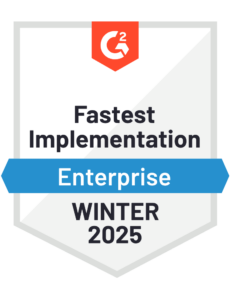Why Financial Automation Initiatives Require A Strong IT and Finance Partnership
Blog post
Share
Technology is becoming more important than ever for businesses to remain successful– and not only because of the recent spike in virtual team collaboration and remote accessibility. Before the 2020 pandemic, a 2019 study found that 84% of organizations stated that automation was a prevalent priority for C-suite executives, because they expected the initiatives would make them more competitive.
Additionally, 46% of the automation implementation responsibilities were executed by the CTO and CIO respectively. And lastly, the study discovered that 61% of organizations already use automation extensively, particularly in the IT, operations and production, customer service and finance departments. Offices of finance that haven’t automated manual-heavy processes— such as account reconciliation, journal entries and transaction matching— are likely already falling behind companies in the market that have automated.
As more organizations adopt financial automation initiatives to streamline and refine their processes, a strong finance and IT collaboration becomes increasingly more crucial. Automation initiatives tend to have a smoother implementation processes and are significantly more effective when these teams are aligned. This blog outlines the other factors involved in financial automation that require these two teams to be in sync.
Security is Paramount
The shifts in business environments caused by the pandemic of 2020 introduced an increase in cybercrime rates. For companies that store both financial and sensitive data, IT teams are constantly evaluating how secure their systems are to withstand a cyberattack, especially when it comes to the Cloud. A popular debate for both IT and finance departments is whether on-premise environments or Cloud technology is more secure. According to Gartner, successful data breaches occur more with on-premise technology, while very few cyberattacks on the Cloud are effective.
Because the IT department is usually in charge of the organization’s information security compliance initiatives, any technology projects for the office of finance will require heavy involvement from the organization’s IT department. It’s crucial that these two teams are in constant communication and are aligned on any future technology goals. Information Security Compliance regulations are in place to help companies improve their information security strategy by providing guidelines and best practices based on the company’s industry and type of data they maintain. Non-compliance with these regulations can result in severe fines, or worse, a data breach.
Changing Work Environment— The Virtual Close
Due to the pandemic, companies quickly shifted their traditional, in-office finance and accounting staff to a virtual setting. To accomplish this, the technology component is arguably the most important factor. And whenever technology is involved, so is IT. When implementing virtual close technology for remote finance and accounting teams, a huge aspect that must be carefully executed is data accessibility.
Finance and IT team members must communicate thoroughly to guarantee that a secure structure is in place that ensures strong controls for financial and other sensitive data. If an organization’s controls are weak, then this potentially drives up the fees surrounding the organization’s audit, since the auditor will need to spend more time getting to the bottom of issues such as incorrect data, conflicting document versions, among other issues that result from a weak control infrastructure.
Additionally, IT must be involved with the “people” aspect that always accompanies technology, particularly the enablement of staff to utilize the implemented software.
In a joint webinar with KPMG on the topic of the virtual close during the 2020 pandemic, Trintech’s CTO, Derick Schaefer said:
“Technology isn’t necessarily a [primary] concern, it’s the enablement of the technology— the training of people to be good at it… from the office of human resources, that training component and going back to the basics: how to use software, how to conduct productive meetings and communicate… is more of a focus for companies.”
Compliance Risk
While data control does need to be established in terms of who can view and download sensitive information, the information needs to be reliable and accurate as well. This is why information security compliance and financial compliance are equally important to consider.
If financial data is not accurate, it means that an internal control is not working properly. This can lead to a ‘significant deficiency’ or ‘material weakness’ in internal controls, which can bring significant board and/or shareholder scrutiny. In order for finance teams to be confident in the integrity of their financial reporting, technology that provides visibility and control over all stages of the financial close process must be implemented.
The global environment is rapidly evolving in a way that technology is no longer a luxury, but a necessity for organizations to survive. Throughout 2020, this fact has only become more apparent. If your finance and accounting teams are still utilizing only manual processes and spreadsheets for close and reporting requirements, you risk not only falling behind other organizations competitively, but opening the company up to potential misstatement as well.
For more information related to the importance of collaboration between the office of finance and IT, organizational success, and how we view our role in that process at Trintech, here are a few articles:
Trintech’s Cloud Financial Platform
Trintech’s Compliance Approach
Written by: Ashton Mathai






